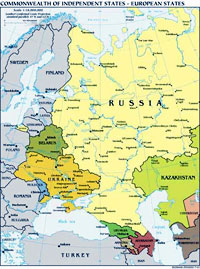Russian March: Scattered, divided, leaderless

(Moscow News – – Anna Arutunyan, Editor and Correspondent at themoscownews.com – November 5, 2013)
According to the Merriam-Webster dictionary, nationalism is defined as “loyalty and devotion to a nation; a sense of national consciousness exalting one nation above others.”
National Day of Unity on November 4 has become an annual venue where nationalists across the spectrum can gather together and vent. But at Monday’s Russian March, I found neither unity nor nationhood.
There obviously was plenty of outright racism and xenophobia. A bespectacled young man, a first-timer at the march, told me he was dismayed by the “gay heresy” and spent several minutes trying to convince me that black people in America were poor because they were genetically inferior. There were scrawny, aggressive teenagers in black masks shouting things like “Kill a khatch, save Russia,” and, while less violent, an equally ominous verse: “Hey there, why don’t you/take a f**king hike/ Russia for Russians/Moscow for Muscovites.” “Khatch” is a derogatory labeling of ethnicities from Asia and the Caucasus.
But what struck me most were the contradictions: an utter lack of any common understanding of what being Russian meant.
During the march, an ethnic Dagestani got into a heated argument with a middle-aged ethnic Russian from Rostov over the definition of Russia. “My native, indigenous land is inside Russia,” the Dagestani insisted. “So what’s your point?” the Russian demonstrator retorted. The point was, if you’re not prepared to have ethnic republics like Dagestan (there are 21 of them) secede, then what, exactly, does “Russia for Russians” even mean? The Russian had no answer.
Or, take this exchange: When I asked a young man with an Imperial flag about who should rule Russia, he told me that in Imperial Russia, “the tsars were Russian.” When I told him that ethnically, they were more German than Russian, he was incredulous. “Well, at least they were Orthodox,” he finally said.
An array of different columns walked the two-kilometer route in the sleepy Lyublino neighborhood as if they didn’t want anything to do with one another. When one group called out for introducing a visa regime with Central Asian countries, an elderly woman passing by said, “What visas? We don’t want any visa regime with anyone. We don’t need anyone else here.” Apparently, she wanted to close the borders outright.
When the march slowed, some demonstrators started calling organizers “dicks” because they were “humiliating” them.
The threat of Russian nationalism has been persistently described since the breakup of the Soviet Union, but it remains one of the most misunderstood aspects about the country today.
That’s probably because nationalism presumes the existence of one nation either purporting to dominate others (like Germany) or declaring its independence from an empire (like Greece, or more recently, former Soviet Baltic republics like Estonia or Latvia). Likewise, you can talk about Ukrainian nationalism, or Dagestani nationalism, or Chechen nationalism. But was ethnic Russia ever a nation – or was it always an empire? Where would its borders lie if it chose to secede from the Russian Federation?
This paradox is not lost on some nationalist leaders, who sometimes describe Russia after the fall of the Soviet Union as a corridor in a communal apartment where all the other rooms have been privatized. For the unlucky owner stuck with a common area after the privatization of an apartment, the only solution would be to sell his share to one of his neighbors and get a separate apartment. But what if you’re talking about a whole country?
Impose a visa regime with Central Asia and get tough on undocumented migrants? That wouldn’t address the animosity between ethnic Russians and Russian citizens from the North Caucasus.
Stop subsidizing ethnic Caucasian republics like Chechnya? That might give them an incentive to turn separatist – and we’ve already seen how that works out.
Or, let non-Russian republics go their own way and declare a Russian nation, based on Russian interests? By definition that’s what a nationalist would declare. Fortunately, that’s not an option under consideration – probably because no one wants to even fathom the violence that could be involved.
If nationalism were really on the rise as many are writing, then we would be seeing a cohesive movement addressing those issues – even if we disagreed with the potential solutions proposed. As it is, something is definitely on the rise, with violence and shouting in the streets and on the Internet – but it’s not nationalism. It’s chaos.
